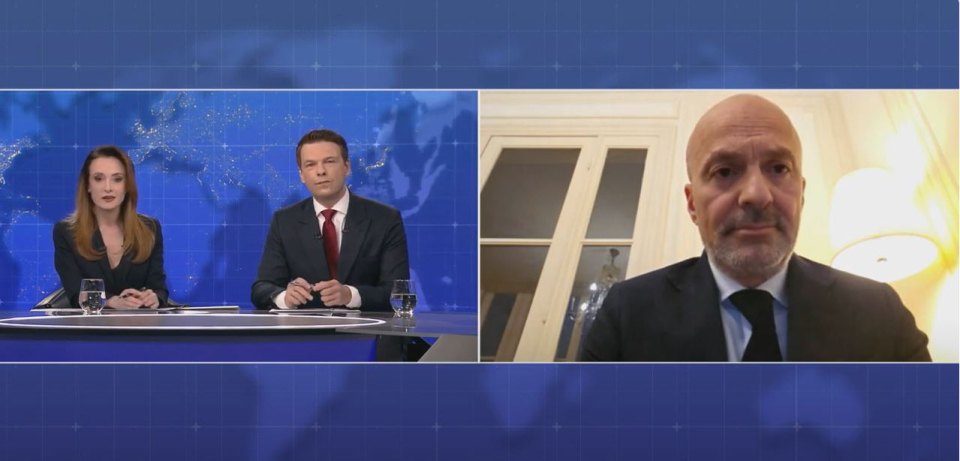Analysis
That "Moment of Clarity" at the UN over Israel
By Daniel Schwammenthal
Outer Space is one of the topics the UN General Assembly’s Fourth Committee handles, in addition to decolonization, Palestinian refugees and human rights. The committee finally had its “Close Encounter” when a translator -- apparently so surprised by the UN’s Israel-bashing that she may as well be from an alien planet -- wondered out loud whether there aren’t more important topics for this august body to deal with than the Jewish state. “I mean, I think when you have five statements, not five, like a total of ten resolutions on Israel and Palestine, there’s gotta be something, c’est un peu trop, non? [It’s a bit much, no?] … There’s other really bad shit happening, but no one says anything about the other stuff.”
The translator left her microphone on and thus unintentionally shared her astute observations with the diplomats in the room. Instead of outrage, which is what you would expect if the proceedings of serious diplomats had been interrupted, the delegates burst into laughter.
Had they been less surprised, we might have seen more studied indignation at the “insult” than spontaneous laughter. But it was just another day in the UN’s alternative universe. For good reason, the video, posted by UN Watch before it could possibly be redacted, has turned viral.
It is rare for ordinary people to speak truth to power, however accidentally, and rarer still to have it captured on film for the world to see. On that day alone, the UN passed nine, repeat nine, resolutions condemning Israel -- and zero on the rest of the world.
Last year, as Hillel Neuer from UN Watch points out, the General Assembly passed 22 resolutions on Israel and just four on the rest of the world combined. The General Assembly is on track to repeat this sad record this year. The intrinsic anti-Israel bias at the UN is even more severe at the world body’s top human rights arm in Geneva.
Established in 2006 to replace the Human Rights Commission, disgraced for its service to dictators and obsession with Israel, the Human Rights Council unfortunately continues many of its predecessor’s failings. It still has the so-called Agenda Item 7, which turns Israel into the only country specifically targeted at every session.
Some 50 percent of the Council’s resolutions and emergency sessions deal with the Jewish state. Israel also remains the only country excluded from the council’s regional group system which prevents it from fully participating in the UN’s work.
As a reaction to this institutional discrimination, Israel boycotted the UN body in Geneva for 20 months, coming back only this October in time for its periodic review. It did so following pressure from various European states who had in return promised to help Israel finally join the “Western European and Others Group", which accepted Israel as a member at the UN headquarters in New York in 2000.
It is disconcerting, though, that the same European countries that pledged their support in Geneva still backed the routine Israel-bashing at the UNGA in New York. Not a single European country opposed any of the nine anti-Israel resolutions, in stark contrast to the U.S. and Canada.
What’s at stake here is not only the international image of Israel and ending its mistreatment in the UN. In the now immortal words of the insightful translator: “There’s other really bad shit happening.” The obsession with the Jewish state’s failings, real or very often imagined, diverts attention from some of the world’s worst human rights violations.
By spending disproportional time and energy adopting one-side resolutions against Israel and investigating the most spurious accusations against the Jewish state, the UN has less time and fewer resources to deal with some of the world’s biggest problems, such as the genocide in Sudan, the millions of victims in the Congo, and the war in Syria.
What’s worse, instead of condemning the world’s most serious human rights violators, the UN elevates their representatives to important positions that remain unattainable for Israel because it is blocked from the regional groups. And so last week, the UN General Assembly took a break from its routine Israel-bashing and elected Algeria, China, Cuba, Saudi Arabia, Russia and Vietnam -- all considered “not free” by Freedom House -- to the UN’s top human rights body. It’s a slap in the face to the millions of victims of these regimes. Instead of naming and shaming dictatorial and authoritarian leaders, the Human Rights Council gives them diplomatic cover for their crimes.
The Saudi ambassador to the UN, for instance, bragged that the, “Kingdom’s election to the Human Rights Council for the third time in a row is yet another confirmation of its pioneering role in the council and the service of human rights.” When the interpreter made her hot mic comments, the video shows the UN Committee’s Secretary commenting rather sheepishly: “I understand there was a problem with interpretation.” Wrong. For once, the UN’s core shortcomings were correctly translated into plain English.
Mr. Schwammenthal is director of the AJC Transatlantic Institute in Brussels. Previously he was an editorial page writer for the Wall Street Journal Europe.









